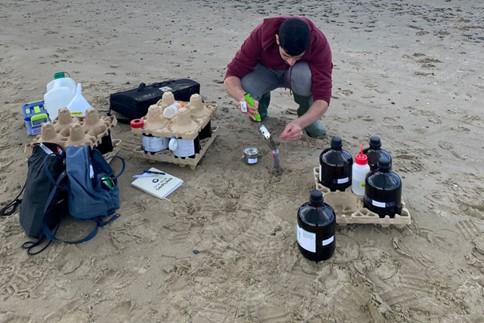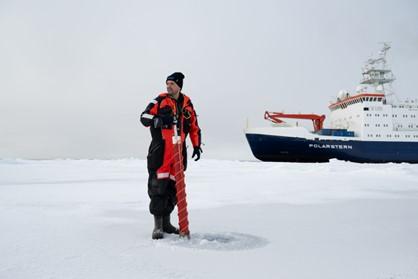
ONE-BLUE is a project funded by the Horizon Europe program and aims to shed light on the presence of contaminants of emerging concern in the ocean. Through various activities, the project aims to improve knowledge of contaminants of emerging concern and provide new solutions to support relevant EU policies.
The consortium has already conducted the first two sample collection campaigns, focusing on the Arctic Ocean and the Irish Sea. This project will conduct 7 more campaigns investigating other areas of the Atlantic Ocean and the Mediterranean Sea, collecting more than 800 samples that will help to understand the impact of emerging contaminants on marine biodiversity and biota.
The Arctic campaign collected 484 samples from the ocean, snow, sea ice core, under ice water, melt pond and leas from sea ice and the bottom of the ocean. This research was led by the Alfred Wegener Institute (AWI). Boris Koch, Deputy head of Division Biosciences and Deputy head of Section Ecological Chemistry in AWI, highlighted the importance of researching in an area that is suffering “strong changes due to climate change, leading to a loss in the extension of the Arctic and affecting to a crucial agent in climate and ocean systems”.
The second campaign was carried out in June this year in the Irish Sea, with members of Dublin City University, the Institute of Environmental Assessment and Water Research and the Institute of Marine Sciences. On this occasion, samples for chemical, toxicity, microplastics, bacterial diversity and metals analysis were taken, as well as samples for PFAS analysis in Burrow Beach and two lots of sediment samples. Anne Morrissey, associate professor in the School of Mechanical and Manufacturing Engineering at DCU, stresses the importance of integrating this area into the research, as “not as much monitoring has been done in the marine environment as perhaps in other countries”.
The next sampling campaign will take place during this summer in the North Adriatic Sea, in front of the Veneto region (Italy). Under the leadership of the University of Padova, water samples will be taken from diverse depths, sediment and fish and shellfish samples in 6 stations.
All samples collected will be taken to Spanish National Research Council, coordinator of the project, and will provide relevant information on the impact of these pollutants in the ocean.
Details
- Publication date
- 21 August 2024
- Author
- Directorate-General for Environment



